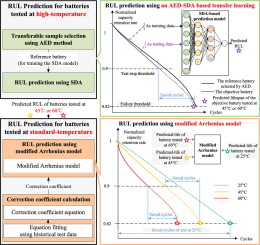Applied Energy ( IF 10.1 ) Pub Date : 2020-01-16 , DOI: 10.1016/j.apenergy.2020.114490 Jian Ma , Shu Xu , Pengchao Shang , Yu ding , Weili Qin , Yujie Cheng , Chen Lu , Yuzhuan Su , Jin Chong , Haizu Jin , Yongshou Lin

|
Cycle life testing in battery development is crucial for the selection of a formulation, but it is time-consuming and costly for battery enterprises. A test optimization approach for different Li-ion power battery formulations is designed based on a hybrid remaining-useful-life prediction method to reduce the high cost of constant temperature–stress testing. The test life is replaced by an accurately predicted lifespan to end the testing early and shorten the cycle number. Batteries having the same formulation and tested at different temperatures are integrally optimized for more test savings. Firstly, high-temperature stress testing is stopped early at a preset threshold, and an instance-based transfer learning method is used to predict the battery lifespan by transferring similar historical test samples of different battery formulations to train a highly robust deep learning prediction model. Standard-temperature testing is completely eliminated by utilizing a modified Arrhenius model to estimate the battery lifespan. The model improvements include replacing the high-temperature stress test lifespan with the abovementioned prediction and introducing a prediction error correction coefficient to increase prediction accuracy. The accuracy of the prediction is verified using actual test data from a battery company, resulting in a time savings of nearly 60%. The optimization strategy has extensive application prospects for other constant-stress tests for batteries and other products.
中文翻译:

使用混合剩余使用寿命预测方法优化不同锂离子动力电池配方的循环寿命测试
电池开发中的循环寿命测试对于选择配方至关重要,但对于电池企业而言既耗时又昂贵。基于混合剩余使用寿命预测方法,针对不同的锂离子动力电池配方设计了一种测试优化方法,以降低恒温应力测试的高昂成本。测试寿命被准确预测的寿命所代替,以尽早结束测试并缩短周期数。对具有相同配方并在不同温度下测试的电池进行了整体优化,以节省更多测试费用。首先,高温应力测试会在预设的阈值下提前停止,基于实例的转移学习方法通过转移不同电池配方的相似历史测试样本以训练高度健壮的深度学习预测模型来预测电池寿命。通过使用改进的Arrhenius模型来估计电池寿命,可以完全消除标准温度测试。模型的改进包括用上述预测值代替高温应力测试寿命,并引入预测误差校正系数以提高预测精度。使用电池公司的实际测试数据验证了预测的准确性,从而节省了将近60%的时间。该优化策略在电池和其他产品的其他恒压测试中具有广阔的应用前景。











































 京公网安备 11010802027423号
京公网安备 11010802027423号